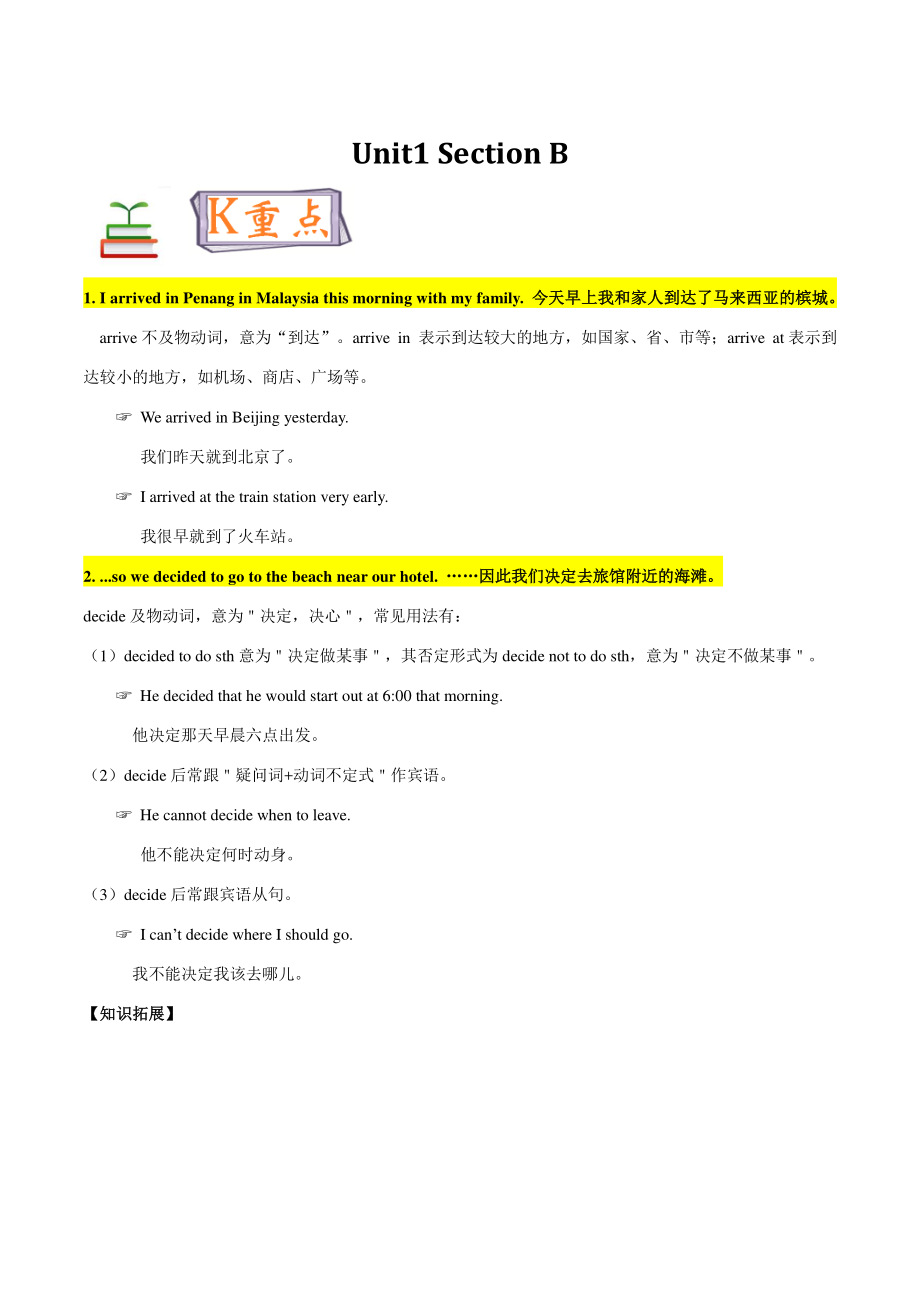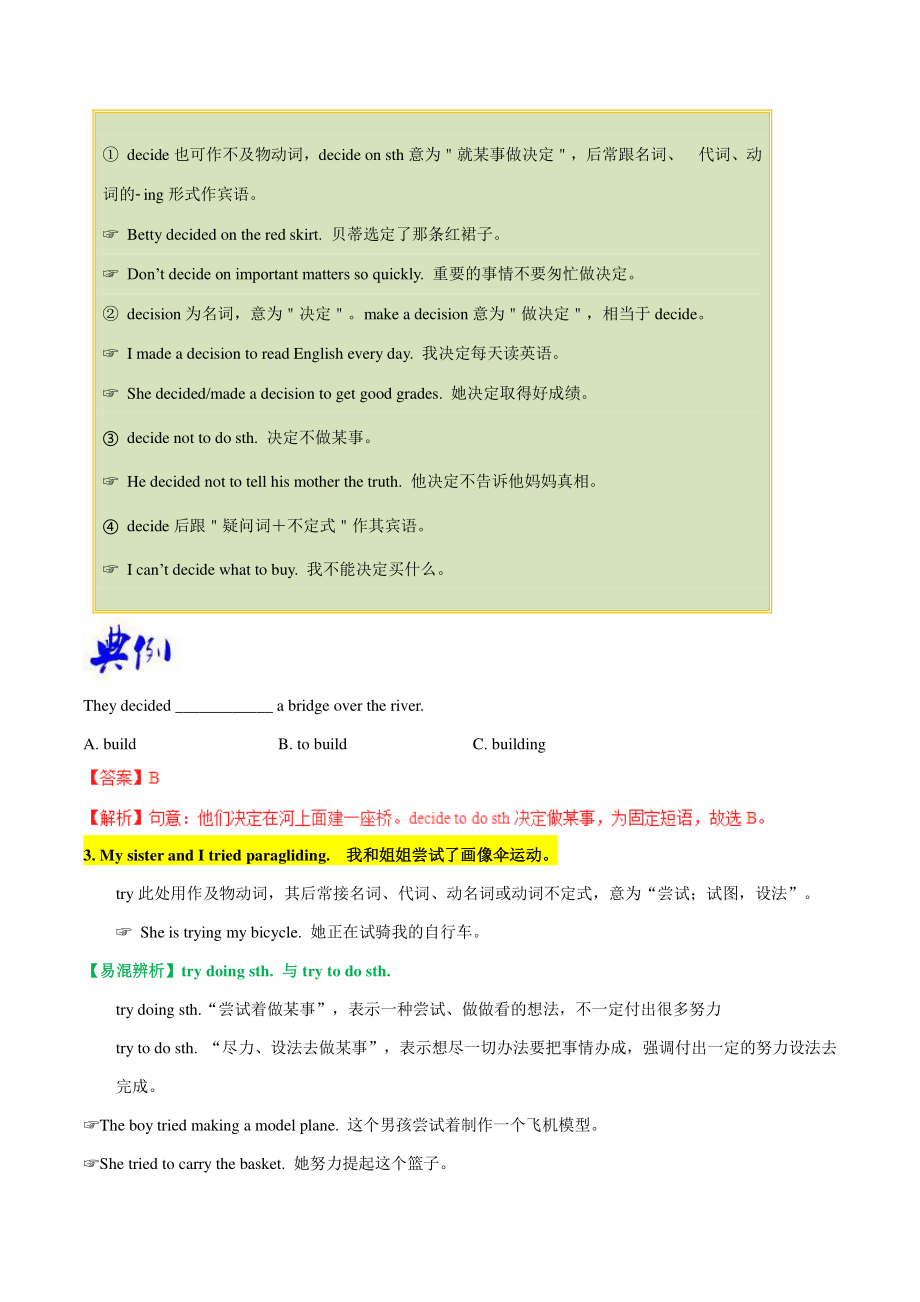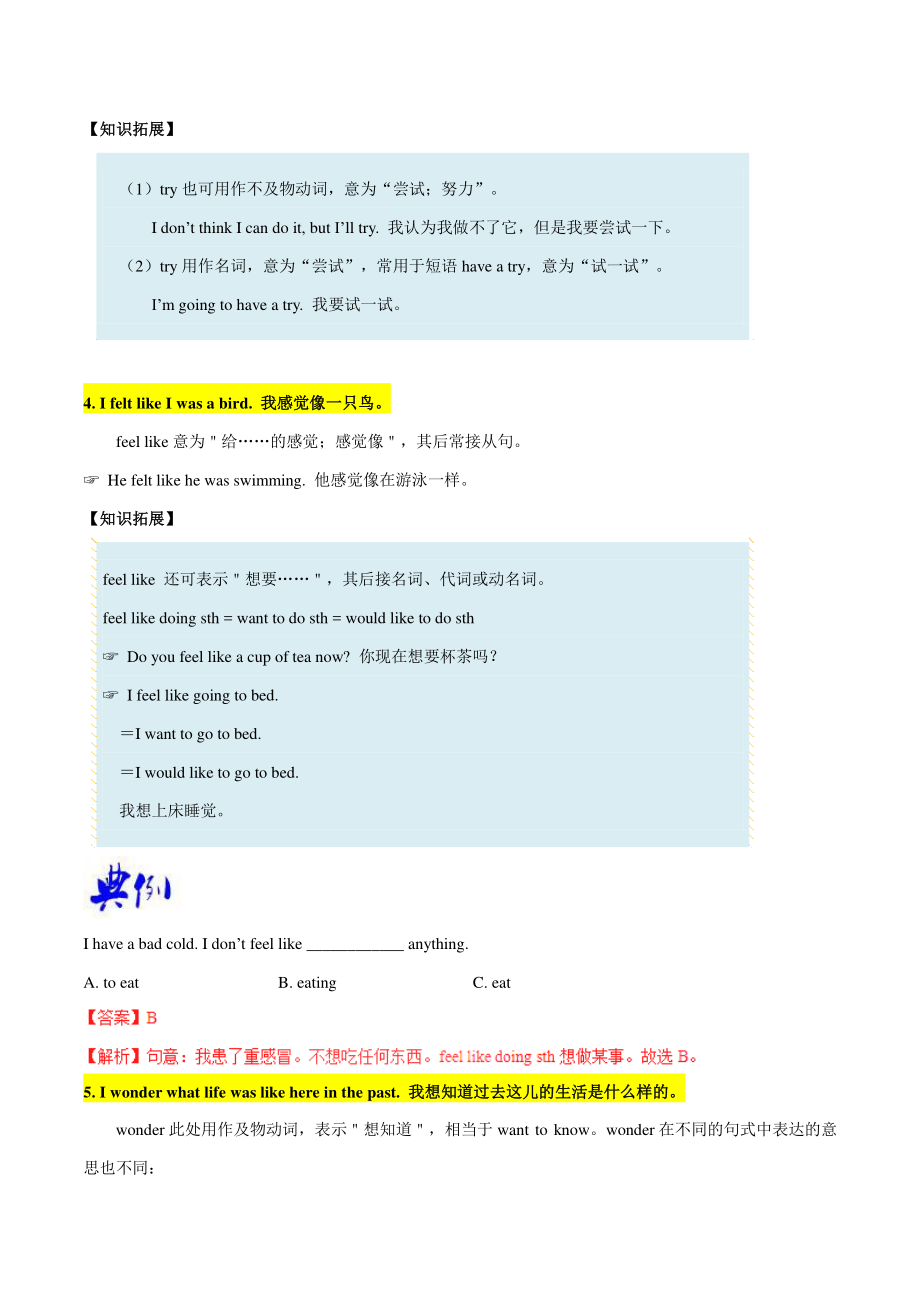 人教版八年级英语上册Unit1 Section B培优讲义(含答案)
人教版八年级英语上册Unit1 Section B培优讲义(含答案)
《人教版八年级英语上册Unit1 Section B培优讲义(含答案)》由会员分享,可在线阅读,更多相关《人教版八年级英语上册Unit1 Section B培优讲义(含答案)(23页珍藏版)》请在七七文库上搜索。
1、 Unit1 Section B 1. I arrived in Penang in Malaysia this morning with my family. 今天早上我和家人到达了马来西亚的槟城。今天早上我和家人到达了马来西亚的槟城。 arrive 不及物动词,意为“到达”。arrive in 表示到达较大的地方,如国家、省、市等;arrive at 表示到 达较小的地方,如机场、商店、广场等。 We arrived in Beijing yesterday. 我们昨天就到北京了。 I arrived at the train station very early. 我很早就到了火车站。
2、2. .so we decided to go to the beach near our hotel. 因此我们决定去旅馆附近的海滩。因此我们决定去旅馆附近的海滩。 decide 及物动词,意为决定,决心,常见用法有: (1)decided to do sth 意为决定做某事,其否定形式为 decide not to do sth,意为决定不做某事。 He decided that he would start out at 6:00 that morning. 他决定那天早晨六点出发。 (2)decide 后常跟疑问词+动词不定式作宾语。 He cannot decide when to
3、leave. 他不能决定何时动身。 (3)decide 后常跟宾语从句。 I cant decide where I should go. 我不能决定我该去哪儿。 【知识拓展】【知识拓展】 decide 也可作不及物动词,decide on sth 意为就某事做决定,后常跟名词、 代词、动 词的ing 形式作宾语。 Betty decided on the red skirt. 贝蒂选定了那条红裙子。 Dont decide on important matters so quickly. 重要的事情不要匆忙做决定。 decision 为名词,意为决定。make a decision 意为做决
4、定,相当于 decide。 I made a decision to read English every day. 我决定每天读英语。 She decided/made a decision to get good grades. 她决定取得好成绩。 decide not to do sth. 决定不做某事。 He decided not to tell his mother the truth. 他决定不告诉他妈妈真相。 decide 后跟疑问词不定式作其宾语。 I cant decide what to buy. 我不能决定买什么。 They decided _ a bridge ove
5、r the river. A. build B. to build C. building 3. My sister and I tried paragliding. 我和姐姐尝试了画像伞运动。我和姐姐尝试了画像伞运动。 try 此处用作及物动词,其后常接名词、代词、动名词或动词不定式,意为“尝试;试图,设法”。 She is trying my bicycle. 她正在试骑我的自行车。 【易混辨析】【易混辨析】try doing sth. 与与 try to do sth. try doing sth.“尝试着做某事”,表示一种尝试、做做看的想法,不一定付出很多努力 try to do st
6、h. “尽力、设法去做某事”,表示想尽一切办法要把事情办成,强调付出一定的努力设法去 完成。 The boy tried making a model plane. 这个男孩尝试着制作一个飞机模型。 She tried to carry the basket. 她努力提起这个篮子。 【知识拓展】【知识拓展】 (1)try 也可用作不及物动词,意为“尝试;努力”。 I dont think I can do it, but Ill try. 我认为我做不了它,但是我要尝试一下。 (2)try 用作名词,意为“尝试”,常用于短语 have a try,意为“试一试”。 Im going to ha
7、ve a try. 我要试一试。 4. I felt like I was a bird. 我感觉像一只鸟。我感觉像一只鸟。 feel like 意为给的感觉;感觉像,其后常接从句。 He felt like he was swimming. 他感觉像在游泳一样。 【知识拓展】【知识拓展】 feel like 还可表示想要,其后接名词、代词或动名词。 feel like doing sth = want to do sth = would like to do sth Do you feel like a cup of tea now? 你现在想要杯茶吗? I feel like going
8、to bed. I want to go to bed. I would like to go to bed. 我想上床睡觉。 I have a bad cold. I dont feel like _ anything. A. to eat B. eating C. eat 5. I wonder what life was like here in the past. 我想知道过去这儿的生活是什么样的。我想知道过去这儿的生活是什么样的。 wonder 此处用作及物动词,表示想知道,相当于 want to know。wonder 在不同的句式中表达的意 思也不同: (1)后接 who,wha
9、t,why,how 等连接词引导的宾语从句及疑问词动词不定式结构: I wonder how you keep in touch with Tom. 我想知道你是怎样和汤姆保持联系的。 I wonder who that boy is. 我想知道那个男孩是谁. (2)后接 if 或 whether 引导的宾语从句时,表示一种委婉的请求或疑问。 I wonder if I could use your mobile phone. 我不知道是否可以用一下你的手机。 (3)后接 that 引导的宾语从句以及动词不定式短语时,表示对感到惊讶。 I wonder to hear her voice in
10、 the room. 我听到房间传出她的声音,十分惊讶。 【知识拓展】【知识拓展】 (1)wonder 作名词时,意为奇迹;奇观。 What are the seven wonders of the world? 世界七大奇观是什么? (2)wonderful 为形容词,可作表语或定语,意为精彩的;绝妙的;令人愉快的。 Its wonderful to see you again! 再次见到你真叫人高兴! Thats a wonderful performance. 那是场精彩的表演。 The teacher _ why she was late again. A. wanted B. won
11、dered C. tried D. felt 【答案】B 6. What a difference a day makes! 一天的差异是多么大呀!一天的差异是多么大呀! difference 可数名词,意为差别;差异,也可作不可数名词。其形容词形式为 different,意为不 同的;有差异的。其副词形式为 differently,意为不同地。 There are many differences between Mary and Jean. 玛丽和琼两人有许多不同点。 He thinks differently; he has a different idea. 他想得不同,他有一个不同的
12、想法。 【知识拓展】【知识拓展】 difference 常构成短语: make a difference 有影响;起作用 make no difference 没影响 the difference(s) between.and. 和两者间的不同点 1. Please find out some _(不同)between the two pictures.(单词拼写) 2. 我的英语老师对我的学习有很大的影响。(完成句子) My English teacher makes _ my study. 【答案】1. differences 2. a big difference 7. wait v.
13、等待;等候等待;等候 wait 作动词时,用法如下: (1)wait for. 等待 They are waiting for a bus. 他们正在等公共汽车。 (2)wait for sb./sth.to do sth. 等某人/物做某事 We are waiting for Jim to come. 我们正等着吉姆的到来。 【知识拓展】【知识拓展】 wait 还可作名词,意为等待;等候。 I dont like this long wait. 我不喜欢这种长时间的等待。 There was a big crowd waiting the opening ceremony to start
14、. A.by B. from C. for D. with 【答案】C 8. too many 太多(修饰可数名词复数)太多(修饰可数名词复数) There are too many cars in the street. 街上有太多的小汽车。 【易混辨析】【易混辨析】 too much 太多的太多的 中心词是 much, 修饰不可数名词, too 用来加强语气。 There was too much work for one person. 一个人做,工作量太大了。 too many 太多的太多的 中心词是 many,修饰可数名词复数, too 用来加强语气。 I have too many
15、 questions to ask. 我有太 多的问题要问。 【知识拓展】【知识拓展】 much too 修饰形容词或副词。中心词是 too,much 用来加强语气。 This dress is much too expensive. 这件连衣裙太贵了。 分辨分辨 too much,much too 与与 too many 的口诀的口诀 三者用法区别看后边 much 后接不可数,too 后修饰形或副。 too many 要记住,后面名词必复数。 Mum, I am hungry. May I have some bread? Of course. But dont eat _ bread. A
16、. so many B. too many C. a few D. too much 9. And because of the bad weather, we couldnt see anything below. 并且因为糟糕的天气,底下的东西我们并且因为糟糕的天气,底下的东西我们 什么也看不到。什么也看不到。 because of 短语介词,意为因为,由于,其后可接名词、代词或名词性成分。 He walked slowly because of the bad weather. 他因为恶劣的天气而行走缓慢。 【易混辨析】【易混辨析】 because of 与与 because becau
17、se of 短语介词, 后可接名词、 代词或名词性 成分 We didnt get there in time because of the heavy rain. 由于大雨,我们没有及时到那儿。 because 连词,意为因为,引导状语从句, 表明直接、明确的原因或理由 We didnt get there in time because it rained heavily. 由于大雨,我们没有及时到那儿。 I cant go to school because the weather is terrible.(改为同义句) I cant go to school _ _ the terri
18、ble weather. 【答案】because of 10. below prep.& adv. 在下面;到下面在下面;到下面 【易混辨析】【易混辨析】 below 与与 under because of 只表示在某物下方或位置、温度等低 于,其反义词为 above。 Write your name below the line. 在线下面写下 你的名字。 because 指在的下方, 有垂直关系, 其 反义词为 over。 Whats under the bridge? 桥底下是什么? In cold winter, the temperature in Harbin often rema
19、ins _ zero all day. A. above B. below C. over D. under 【答案】B 11. enough adj. 充足的;足够的充足的;足够的 adv. 足够地;充足地足够地;充足地 enough 修饰名词时,常放在名词的前面;有时也可放在名词之后;enough 修饰形容词、副词时,常放 在它们的后面。 There is enough food for everyone. 有足够的食物供每个人吃。 He is only twelve. He is tall enough. 他只有十二岁,他够高了。 【知识拓展】【知识拓展】 . enough (for s
20、b.) to do sth.意为(对某人来说)做某事足够。 The story is easy enough for little kids to read. 这个故事很容易,连小孩都能读懂。 【巧学妙记】【巧学妙记】 enough 在句中的位置在句中的位置 修饰名词很自由,可以前来也可后; 若是修饰形或副,一定后置要记住。 We still have _ to make this birthday cake look _. A. time enough;enough good B. enough time;enough good C. enough time;good enough D. e
21、nough time;enough well 【答案】C 【点拨】句意:我们仍有足够的时间让这个生日蛋糕看起来足够好。 12. find out 查明;弄清查明;弄清 Can you find out what time the meeting starts? 你能查清楚会议什么时候开始吗? 【易混辨析】【易混辨析】 look for,find 与与 find out look for 寻找, 强调寻找的过程, 但不一定 能找到。 He began to look for a new job immediately after he was fired. 他被解雇后立即开始寻找 一份新工作。
22、To look for a needle in a haystack. 大海捞针。 find 发现,找到,强调结果,通常指偶 然发现。 Im looking for my key, but I cant find it. 我正 在找我的钥匙,但是我找不到它。 find out 查明, 找出, 经过一番努力最终找 到,具有目的性。 Please find out when the train leaves. 请查一下 火车什么时候离站。 Please f_ out what time they are coming. 【答案】find I. 根据句意及首字母提示填写单词根据句意及首字母提示填写单
23、词 1. The food is very d_. Would you like to have some? 2. The children had an e_ trip last Sunday and they were very happy. 3. The weather is too t_. We have to stay at home. 4. I dont like the talk show. It is very b_. 5. Why dont you want to buy that dress? Because it is too e_. 6. Dont worry. You
24、 still have e_ time to finish your math test. K 基础基础 7. That new b_ has about 30 floors. 8. We can do lots of a_ after school like swimming, singing and dancing. 9. Its raining outside. Please take an u_ with you. 10. We all got w_ in the rain yesterday. II. 用括号内所给单词的适当形式填空用括号内所给单词的适当形式填空 1. There _
25、(be) quite a few students in the library that day. 2. Sam and David _(come) to China last month. 3. My sister _(not do) housework yesterday. 4. His brother _(watch) TV yesterday evening. 5. When _ they _(get) to Hubei yesterday? They _(get) there at four oclock in the afternoon. 6. Can you find a _(



- 配套讲稿:
如PPT文件的首页显示word图标,表示该PPT已包含配套word讲稿。双击word图标可打开word文档。
- 特殊限制:
部分文档作品中含有的国旗、国徽等图片,仅作为作品整体效果示例展示,禁止商用。设计者仅对作品中独创性部分享有著作权。
- 关 键 词:
- 人教版八年级英语上册Unit1 Section B培优讲义含答案 人教版八 年级 英语 上册 Unit1 讲义 答案
 七七文库所有资源均是用户自行上传分享,仅供网友学习交流,未经上传用户书面授权,请勿作他用。
七七文库所有资源均是用户自行上传分享,仅供网友学习交流,未经上传用户书面授权,请勿作他用。
文档标签
- 人教版八年级英语上册Unit1
- B培优讲义含答案
- 人教版八
- 人教版八年级英语上册Unit1 Writing培优讲义含答案
- 人教版八年级英语上册Unit1 Grammar培优讲义含答案
- 人教版八年级英语上册Unit4 Writing培优讲义含答案
- 人教版八年级英语上册Unit4 Grammar培优讲义含答案
- 人教版八年级英语上册Unit3 Writing培优讲义含答案
- 人教版八年级英语上册Unit3 Grammar培优讲义含答案
- 人教版八年级英语上册Unit2 Grammar培优讲义含答案
- 人教版八年级英语上册Unit2 Writing培优讲义含答案
- 人教版八年级英语上册Unit1单元综合检测培优试卷含答案
- 人教版九年级英语Unit1 Section A培优讲义含答案
- 人教版九年级英语Unit1 Section B培优讲义含答案
- 人教版八年级英语上册unit1听力
- 人教版八上培优
- 八年级英语上册unit1
- 广州版八年级英语上册unit1



 浙公网安备33030202001339号
浙公网安备33030202001339号
链接地址:https://www.77wenku.com/p-190054.html